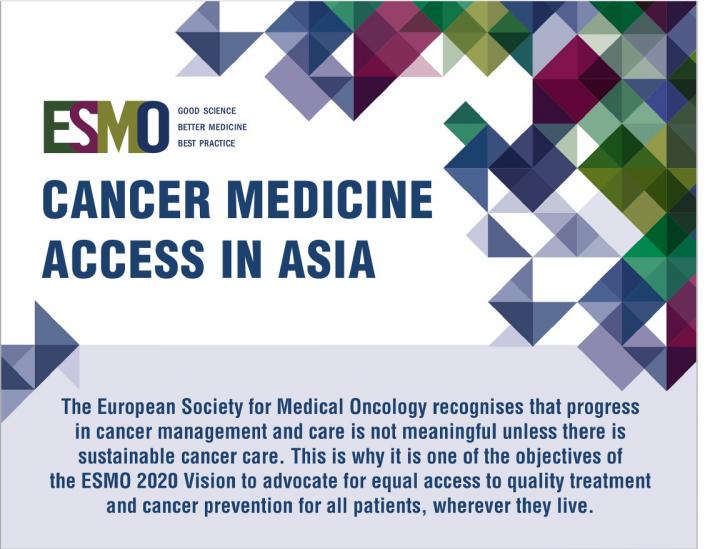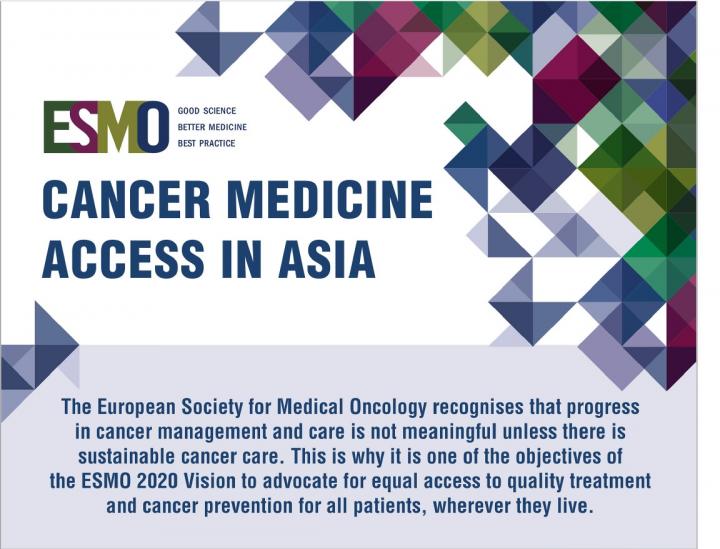
Credit: © European Society for Medical Oncology
LUGANO, Switzerland – The European Society for Medical Oncology (ESMO) opened its 3rd ESMO Asia Congress today, once again in Singapore, attracting close to 3000 regional and international cancer doctors with leading researchers and experts to promote advances in science, diagnosis, treatment, and best practices for cancer patients in Asia.
Cancer is a major burden worldwide. It is the second leading cause of death globally with nearly 1 in 6 people dying of cancer each year (1) and Asia accounts for half the global burden of cancer (2). According to the World Health Organization (WHO), we anticipate to see a 70% increase in new cancer cases in the next two decades. In Singapore alone, about 35 people are diagnosed with cancer every day (3) and cancer remains the principal cause of mortality, accounting for 3 out of every ten deaths (4), with lung, colorectal, and breast cancers being the most common. (5) This is why cancer is becoming one of the most important health problems in Asia.
"Cancer knows no border and neither does ESMO", said Professor Fortunato Ciardiello, ESMO President. "Cancer patients and their needs are at the centre of what we do. As the leading professional organization for medical oncology, it is our mission to boost collaboration between Asia, Europe and the global oncology community. Ultimately, this multinational and multidisciplinary exchange of knowledge benefits cancer patients, not only in Asia, but across the world."
The inaugural ESMO Asia Congress was held in 2015 in Singapore where medical professionals representing various oncology disciplines from 75 countries came together to discuss and share key research and developments in oncology. This year, the Congress is supported by 21 oncology associations in the region, including the Singapore Society of Oncology and oncology societies from Australia, Bangladesh, China, Hong Kong, India, Indonesia, Iran, Japan, Malaysia, Myanmar, New Zealand, Pakistan, Philippines, South Korea, Taiwan, Thailand and Uzbekistan.
At the Congress Opening Session, Dr GAN Kim Yong, Singapore Minister for Health, addressed the ever-increasing prevalence of cancer worldwide, which is causing pronounced societal and economic impact of cancer on the individuals affected by cancer and their families, on workplaces, as well as the healthcare system as a whole. He stressed the importance for the medical and research community to continue to build capabilities and strengthen partnerships, work with governments and stakeholders around the world to further improve patient outcomes and cancer care.
As part of the ESMO 2020 Vision to identify and address the main developments, challenges and opportunities shaping oncology in the years ahead, the Society also revealed the results of the ESMO International Consortium Study on the availability, out-of-pocket costs and accessibility of anti-cancer medicines, advocating for equal access to quality treatment for cancer patients across Asia.
Among the countries outside of Europe that were surveyed in the study, 20 are in Asia and are economically stratified as high-income, upper middle-income, lower middle-income, and low-income countries according to World Bank Criteria. (6) The results of the study highlighted dramatic disparities of access to anti-cancer medications, even among medications on the World Health Organization's (WHO) Model List of Essential Medicines (7,8), which ideally should be available and affordable for everyone who needs them.
In Lower Middle- and Low-Income countries, many essential anti-cancer medications recommended on the WHO's Model List of Essential Medicines are available only at full cost as an out-of-pocket expense for the patient, and accessibility is limited for many reasons including unreliable supply. In addition, many of the recently approved anti-cancer agents (9) are often unavailable or available only at a high level of personal expense in countries other than those which are most economically developed. On average, about 75% of essential and recently approved anti-cancer drugs are available only at full cost in Lower Middle- and Low-Income countries, whereas in upper middle- and high-income countries, about 25% of anti-cancer drugs are available at full cost to patients. Collectively these data indicate that in many counties of Asia, particularly those with lower levels of economic development, substantial reforms in health service delivery are needed to meet the goal of providing accessible and affordable cancer care.
Dr Ravindran Kanesvaran, President of the Singapore Society of Oncology, the local host of the congress said: "The ESMO Asia Congress provides a platform for international and Asian experts to present cancer research and its translation in a way that is relevant to patients in our region. This year, as well as science, we will also hold important discussions on cultural issues and policy: cancer screening, the need to reduce gaps in access to the best cancer treatment and to advocate for cancer patients in Asia to be treated according to the best global standards."
###
For more information about the programme and activities for ESMO Asia, please visit the ESMO website (2).
Notes to Editors
Please make sure to use the official name of the meeting in your reports: ESMO Asia 2017 Congress The infographic with key results of the ESMO International Consortium study will be available on the ESMO website.
References
(1) D. Hashim, P. Boffetta, C. La Vecchia, M. Rota, P. Bertuccio, M. Malvezzi & E. Negri. The global decrease in cancer mortality: trends and disparities. Annals of Oncology 2016, 27: 926-933, DOI: https://doi.org/10.1093/annonc/mdw027
(2) ESMO Asia 2017 Congress: http://www.esmo.org/Press-Office/Press-Releases/ESMO-Asia-2017-Congress
About the European Society for Medical Oncology (ESMO)
ESMO is the leading professional organisation for medical oncology. With 17,000 members representing oncology professionals from 150 countries worldwide, ESMO is the society of reference for oncology education and information. We are committed to supporting our members to develop and advance in a fast-evolving professional environment.
http://www.esmo.org
Twitter: @myESMO; #ESMOAsia17
Facebook: esmo.org
Youtube: ESMOchannel
Media Contact
Yuliana Lopez
[email protected]
@myesmo
http://www.esmo.org
Original Source
http://www.esmo.org/Press-Office/Press-Releases/ESMO-Asia-2017-Congress-Opened-Today





